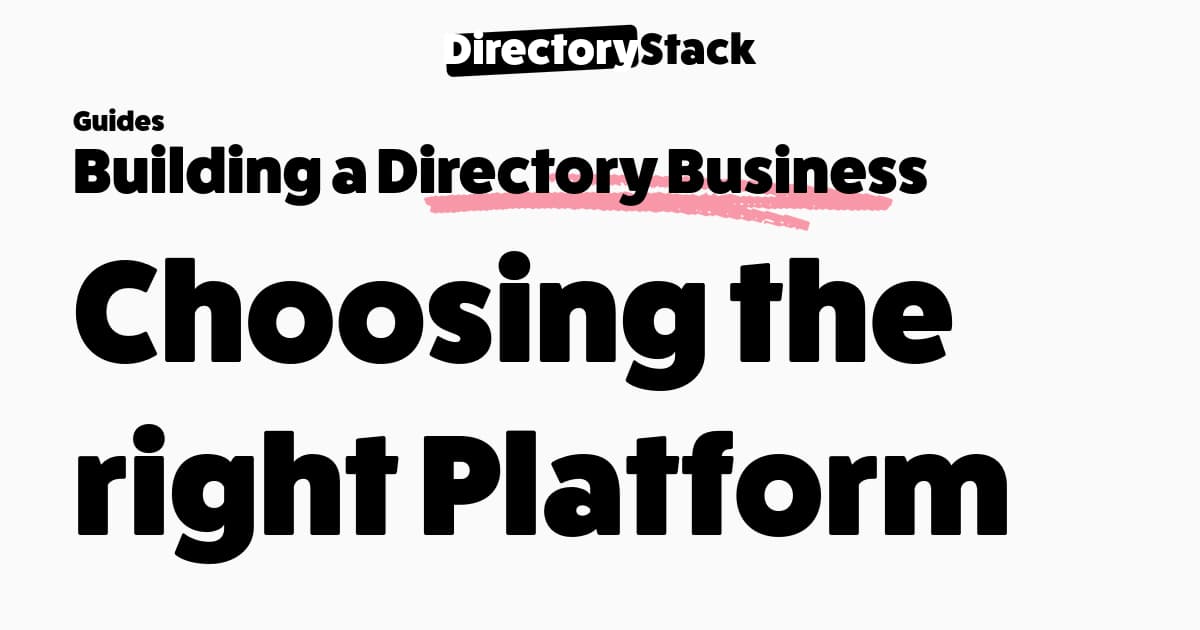
Building a directory website can be a rewarding journey, but choosing the right platform is crucial to your project's success. With options ranging from no-code tools to WordPress and template-based solutions like DirectoryStack, each offers distinct advantages and challenges. This article will help you understand these differences and why a template-based approach might be the best choice for your needs.
No-code platforms, such as Webflow or Bubble, are popular for their ease of use. They allow users with little to no programming skills to create websites using drag-and-drop interfaces.
- Ease of Use: No coding required.
- Speed: Quickly set up and deploy websites.
- Pre-built Components: Access to a variety of elements and widgets.
However, these tools can be limiting in terms of customization and scalability, and will get expensive REAL fast.
- Limited Customization: Often restricted to the platform's offerings.
- Scalability Issues: Can struggle with larger or more complex projects.
- Higher Long-term Costs: Subscription fees can add up over time. Check what you will need to pay once you scale a bit.
- Vendor Lock-in: Limited to the features and infrastructure of the no-code platform.
- Performance Limitations: May not be optimized for speed and performance.
WordPress is a versatile and widely-used platform that offers numerous themes and plugins, including those tailored for directory websites.
- Flexibility: Extensive plugin ecosystem allows for varied functionality.
- Large Community: Abundant resources, forums, and tutorials available.
- SEO-friendly: Tools and plugins to help optimize for search engines.
Despite its versatility, WordPress can have drawbacks, especially if not properly managed.
- Complexity for Beginners: Steeper learning curve for non-technical users.
- Maintenance: Requires regular updates and management to ensure security and performance.
- Performance Issues: Can be slow if overloaded with plugins or poor hosting.
- Customization Costs: May require external developers for more advanced customization.
- Security Vulnerabilities: Susceptible to hacking if not adequately secured.
Template-based platforms, such as DirectoryStack, offer a balanced approach, combining ease of use with flexibility and scalability.
- Fully Customizable: Unlike no-code tools, templates provide the freedom to modify code and design, allowing for a unique look and feel.
- Scalability: Built to handle growth, templates can support large databases and traffic spikes.
- No Vendor Lock-In: Owning the codebase means you're not tied to a specific service provider, giving you control over hosting and future development.
- Optimized Performance: Templates are often optimized for speed and efficiency, improving user experience.
- Cost-Effective: While there's an initial investment, templates can be more cost-effective in the long run due to lower maintenance costs and flexibility in choosing hosting solutions.
While template-based solutions offer many advantages, they may require a bit more technical knowledge compared to no-code tools.
- Initial Learning Curve: May require some familiarity with web development concepts. That being said, with themes and pre-made building blocks, you do not have to be an expert developer.
- Upfront Costs: There are initial investment in purchasing a high-quality template. However, DirectoryStack is a ONE-TIME fee. Buy once, own forever. Oh, and build unlimited directories with it.
- Customization Workload: While customizable, achieving the desired result may take more effort compared to no-code tools. Good thing, the tech stack with React, NextJS and TypeScript is what everyone is using nowadays. You won't need to worry about finding experts - ChatGPT will suffice!
Choosing the right platform depends on your specific needs, skills, and resources. No-code tools are ideal for those seeking quick setup and simplicity, while WordPress offers extensive customization at the cost of complexity and maintenance.
Template-based solutions like DirectoryStack offer a powerful middle ground, providing full customizability, scalability, and control without vendor lock-in. This makes them an excellent choice for those looking to build a robust, long-term directory website with the flexibility to adapt and grow.
Explore DirectoryStack's Feature Set and start building your custom directory website today, leveraging the best of both ease and flexibility.
Best,
Till

